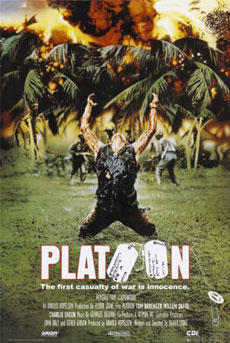As the film opens, Chris arrives in a troop transport and immediately
sees a helicopter arriving from the field, bringing dead soldiers for
transport home. A foreshadowing of what is to come, the sight also informs
Chris that his ideas about war were naive.
Unlike most of his fellow soldiers, Chris volunteered for the Army,
a decision he would come to regret. Through his eyes, the viewer experiences
the living conditions, interpersonal relationships and rivalries, and
battlefield brutalities of the war front.
At the beginning of the film, nearly 30 soldiers serve in the unit,
with casualties claiming soldiers throughout the film. It's understandable,
perhaps, that they all cope in different ways, some becoming fatalistic,
others nihilistic, some dulled to the pain, others a walking nerve.
Chris, through his letters home, reveals his plunge into depression
and his growing fears he will not return home.
The film is loosely based on Oliver Stone's own experiences fighting
with two units in Vietnam. He wrote the script in 1976, while his memories
were still fresh, but could not convince a studio to make the film until
a decade later. Vietnam veterans who previewed the film, including members
of his own unit, applauded the movie for its accurate portrayal of wartime
experiences.
Stone shot the film on location in The Philippines, and the actors
were required to spend two weeks undergoing an intense boot camp to
prepare them for their roles. Such a practice has become almost commonplace
among today's directors of war movies, for the way it helps actors get
into character, bond as a unit, and learn to imitate proper military
form with weapons and maneuvers. Shooting began immediately afterwards
so the actors wouldn't lose their edge. In addition, Stone has said
that he wanted the actors to be fatigued so they would be burnt out
and therefore in character.
Since the film was shot sequentially, for the most part, as characters
were killed, the actors went home, as well. This helped to reinforce
the emotions of the remaining cast members, who had bonded with, and
likely missed, their fellow actors.
The strengh of Stone's movie, however, are the characters. A cross-section
of American life, they nevertheless find a common bond through the struggle
to survive. Two of the platoon's sergeants, Berenger's Sgt. Barnes and
Dafoe's Sgt. Elias, approach the battlefield very differently: with
Barnes (who has survived seven shootings and bears a prominent scar
on his cheek) taking a brutal, hold-no-prisoners approach, and Elias
still maintaining strict moral codes. As Chris observes, it's like the
two sergeants are battling for the souls of the men who serve under
them.
The cast of Platoon is impressive, boasting several actors who
later went on to receive acting nominations or Oscars. Berenger was
nominated for a Best Actor Oscar for Platoon and won the Golden
Globe for the same role. Dafae was nominated for Best Actor in a Supporting
Role for Shadow of the Vampire (2000) and was also nominated
for Best Actor in a Supporting Role for Platoon. Sheen won a
Golden Globe for the TV series Spin City (1996) and has been
nominated for and won mutiple other awards.
In addition to the principles, among the cast are Forest Whitaker (won
Best Actor Oscar for The Last King of Scotland, 2006), John C.
McGinley (nominated for Television Critics Association Award and Golden
Satellite Award for his role on TV series Scrubs; won Festival
Director's Award at Method Fest for Two Tickets to Paradise, 2006),
Kevin Dillon (nominated for Golden Globe and Emmys for his role on TV
series Entourage), Mark Moses (won Screen Actors Guild Awards
for the TV series Madmen, 2007 and Desperate Housewives, 2004);
and Johnny Depp (nominated for Best Actor Oscar for Sweeney Todd:
The Demon Barber of Fleet Street, 2007; nominated for Best Actor
Oscar for Finding Neverland, 2004; nominated for Best Actor Oscar
for Pirates of the Caribbean: The Curse of the Black Pearl, 2003;
nominated and won multiple other awards).
Interestingly enough, the cast also included, in a small part, Vietnam
veteran Captain Dale Dye, who trained the actors in military practices.
Dye is the founder of Warriors Inc., which provides technical advisory
services to the entertainment industry. In a more unlikely role, the
lead singer of the group Living Colour played one of the members of
the unit.
The film is the first part of Stone's Vietnam War trilogy, which also
included Born on the Fourth of July (1989) and Heaven &
Earth (1993).
Because of the script, the attention to detail, and the incredible
acting, Platoon was not only the first realistic Vietnam War
movie but also stands as one of the best war movies of all time, along
with previous Oscar winners All Quiet on the Western Front (1930),
Bridge Over the River Kwai (1957) and Patton (1970).
Rating: ***** (5 out of 5 stars)


